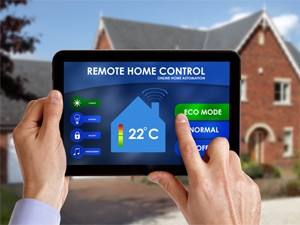
Good quality connectivity, affordability and consumer education and rationale are all factors curbing the local smart home market, despite recent movements in the area, say analysts.
Earlier this month, US-based Link-Union unveiled a smart home hub, called the link-U - part of its link-U Hybrid SmartCam. The company claims this is the world's first 3G/4G/WiFi video monitoring and home automation hub.
While the smart home hub can be purchased and shipped to SA (it will work with any SIM or home local area network connection), the company has confirmed it has no intention as yet of partnering with local sales channels.
Africa Analysis analyst Dobek Pater says, as is often the case, smart home technology - or automated home systems - is an evolution, rather than a revolution. "We need to see more good quality connectivity deployed and taken up, and the price of smart home devices decrease.
"Adoption of smartphone solutions is also a mindset and it will probably take some time for the SA consumer to embrace the concept. ICT players are moving into the video-on-demand (VOD) market and will preposition themselves for the smart home, but will probably commit limited investment until they see a larger opportunity."
Dormant demand
While consumer demand for VOD services has become patently present in SA this year, the demand for broader smart home capability is yet to reach the level at which it would motivate ICT players to invest heavily in the space. Ovum analyst Richard Hurst says, perhaps the biggest hurdle to creating demand, will be that of educating end-users on the benefits of a smart home.
ICT expert Adrian Schofield says it is too early to talk about a smart home market in SA, as the technology is very new and expensive to install. "While we can readily see the demand for VOD, as long as the product is desirable and affordable, there are currently relatively very few homes in SA that suit themselves to [smart home] automation. The ability to have your own IP CCTV has been around for a long time, of course, but I would hazard a guess that the number of installations is not large."
The South African market is in a nascent stage, with products only now being introduced to the market, says Pater. In fact, analysts point out, the smart home market globally is still very young. "[In SA] one could argue that to date Altech's Node can be classified as the only true smart home device introduced to the market; other products offer only connectivity," says Pater.
World Wide Worx MD Arthur Goldstuck points out, however, that the Node - not the only product that offers smart home solutions, but rather a catch-all product - is a bolt-on solution, rather than an in-built one.
On top of that, he says, affordability is the biggest barrier to the take-up of smart homes. He points out Node users need to pay higher subscriptions depending on the number of connections they want.
Wild West
However, like fibre-to-the-home (FTTH), smart home technology is evolving rapidly, says Goldstuck. He points out there has already been a "massive explosion" in wireless IP cameras and there are new complexes being built with the smart home in mind. "You now get bricks that are designed with a conduit through them, for cabling.
"We will probably see demand and technology becoming fairly mainstream within the next 18 months or so."
When it does, he says, it is going to be a "Wild West" in terms of suppliers, with everyone - including those who install antennas, geysers and electrical infrastructure - wanting to get in on the action.
"But people must bear in mind that a DStv installer - for example - doesn't necessarily have experience beyond basic installation. And, beyond electricity compliance, electricians aren't bound to control measures, so it's a case of shop around and buyer beware. There is no certification around smart home installations."
Share